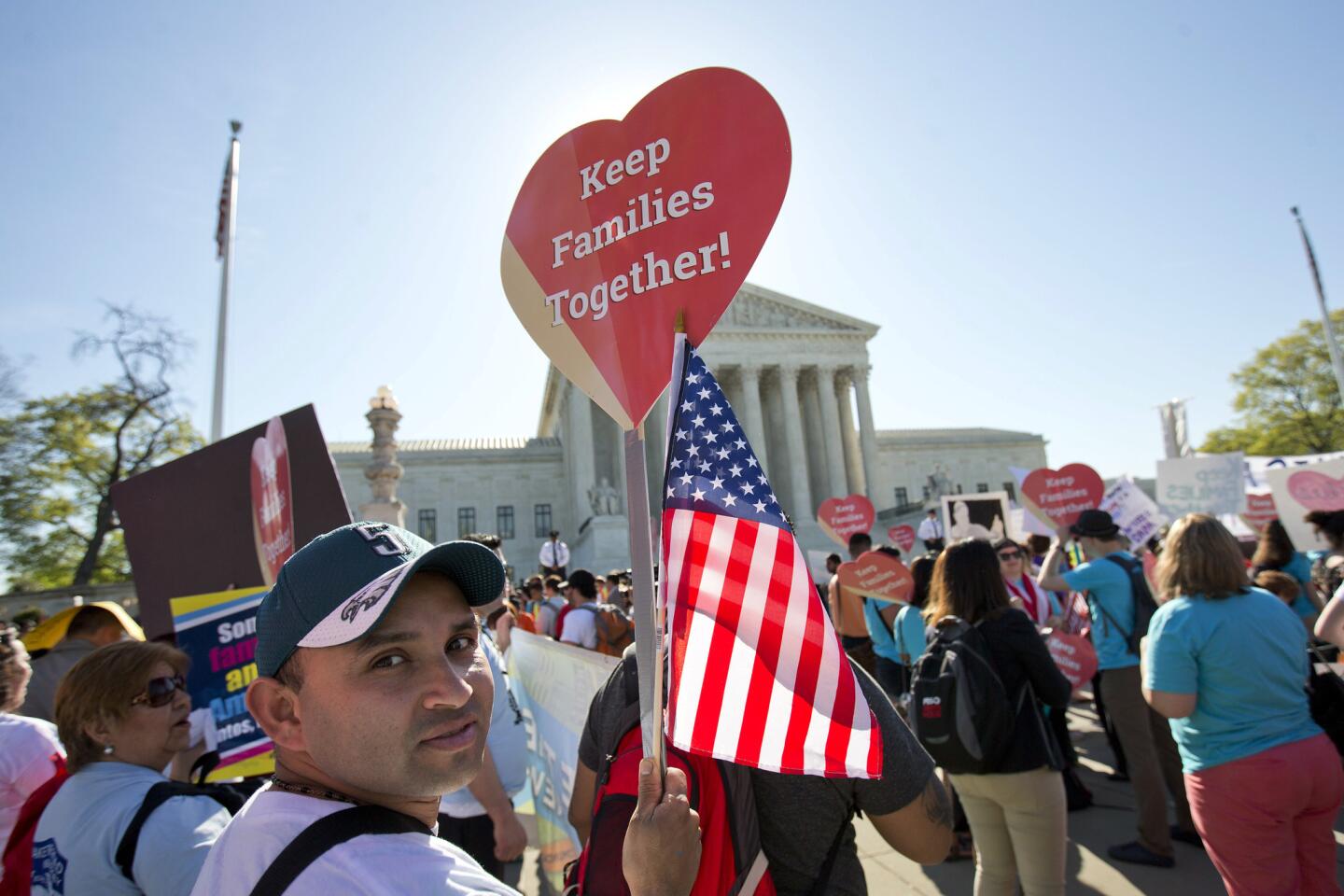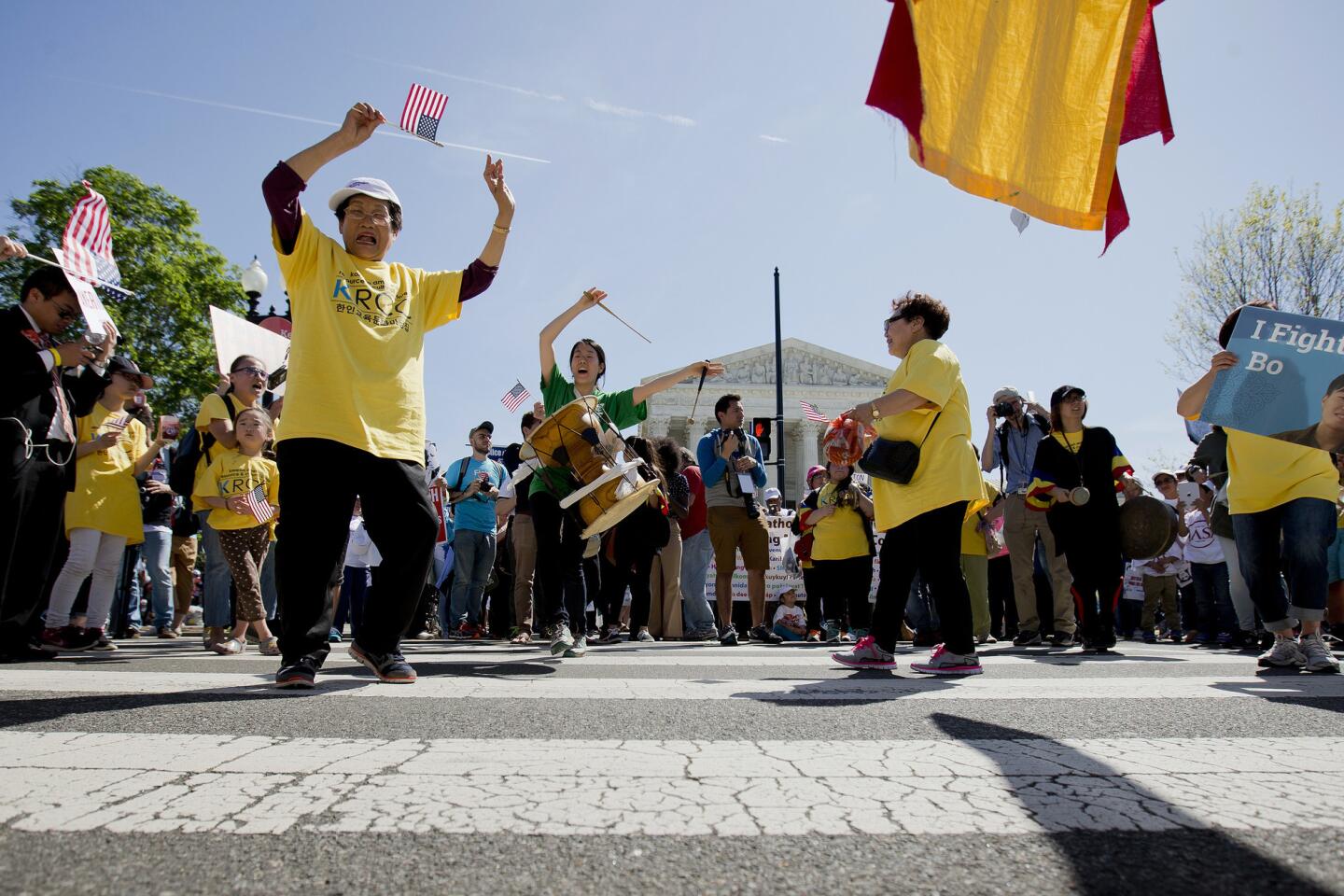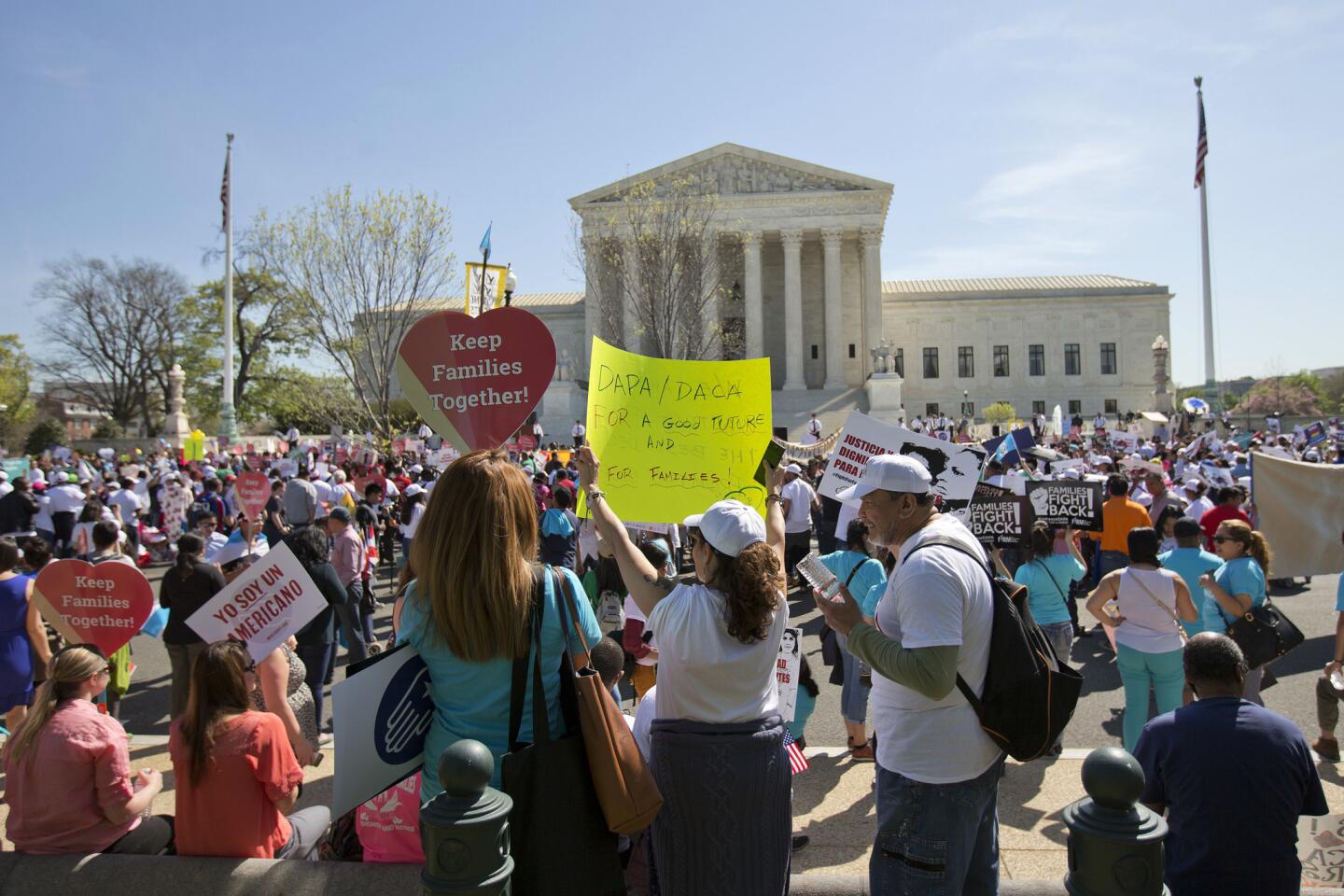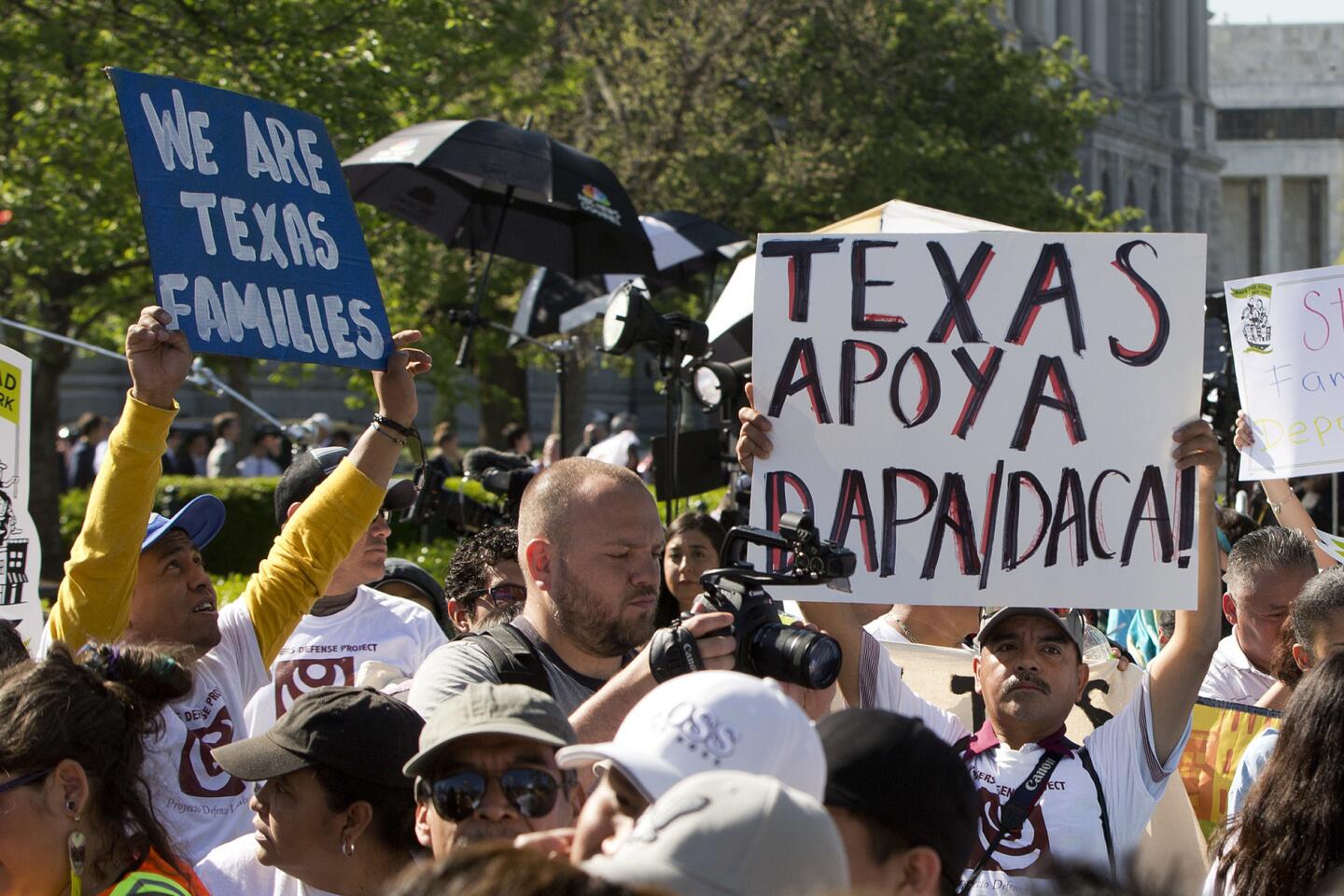Obama’s immigration plan appears to be in trouble after Supreme Court hearing
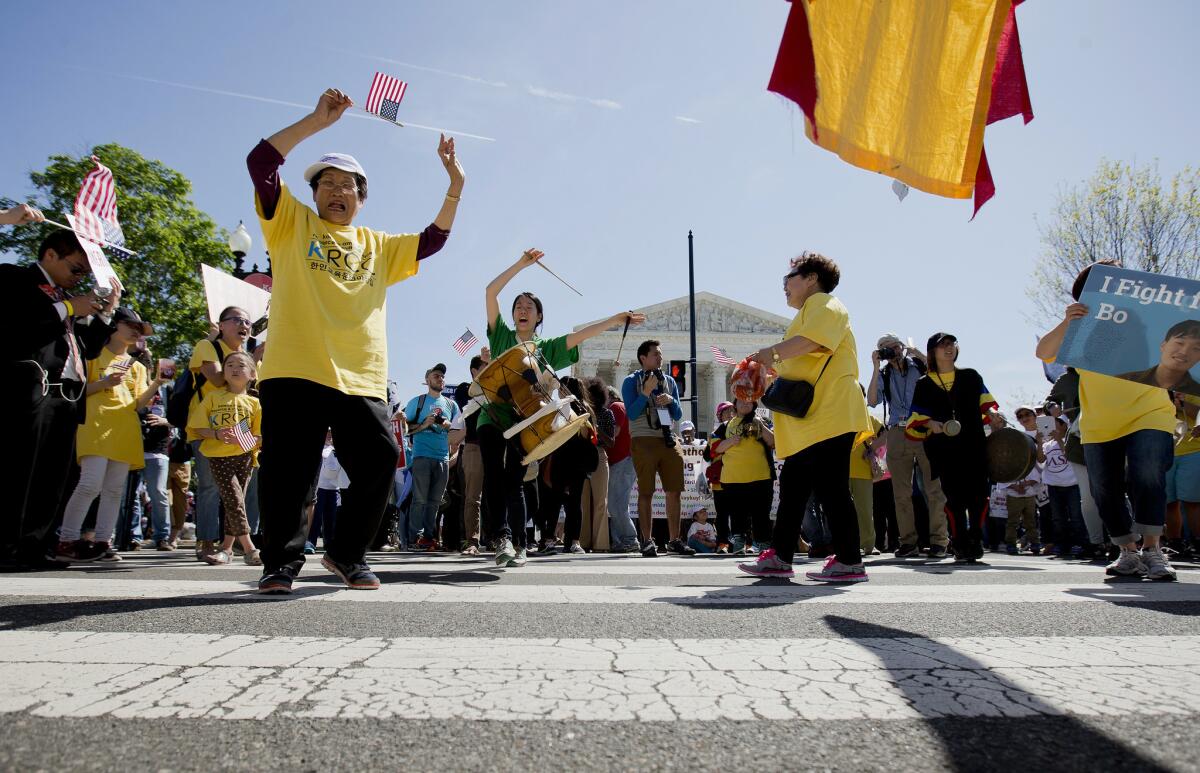
Immigration reform supporters outside the Supreme Court in Washington.
Reporting from Washington — President Obama’s far-reaching plan to ease life for millions of immigrants in the U.S. illegally ran into solid conservative opposition at the Supreme Court on Monday, putting its fate in doubt.
The administration’s supporters were left to hope that justices — evenly divided between Republican and Democratic appointees since the death of Justice Antonin Scalia — might dismiss the Texas case on a legal technicality by finding the state of Texas cannot show it would be sufficiently harmed by the president’s program.
But the comments and questions during Monday’s argument suggested the court’s four conservatives probably would side with Texas and 25 other Republican-led states, while the four liberals would vote to uphold Obama’s plan.
If so, the 4-4 split would be a defeat for the administration, keeping in place a federal judge’s order that has blocked the plan from taking effect.
At issue is whether the president has the authority to temporarily remove the threat of deportation and offer a work permit to more than 4 million immigrant parents of children who are U.S. citizens or lawful permanent residents.
Obama’s lawyers argued that U.S. immigration laws give the chief executive broad leeway in deciding whom to deport, including the authority to take no action against millions of working immigrants who have families here and no serious criminal records.
But in the opening minutes of arguments Monday, Chief Justice John G. Roberts Jr. and Justice Anthony M. Kennedy said Obama’s order appeared to go further by in effect changing the law and reclassifying millions of immigrants so that they may stay and work legally in the U.S.
Roberts asked the president’s attorney whether there were any limits to executive authority when it comes to deportation. “Could the president grant deferred removal to every unlawfully present alien in the United States?” Roberts asked.
No, replied U.S. Solicitor Gen. Donald Verrilli Jr., noting that the law still calls for arresting criminals.
“OK. So not criminals. Who else?” Roberts continued.
Justice Samuel A. Alito Jr. interjected to say that, under the administration’s legal theory, a future president might decide unilaterally on an “open borders” policy, regardless of what Congress decided.
Verrilli disagreed. “That’s a million miles from where we are now,” he said.
Kennedy, whose vote is seen as crucial for the administration, leaned forward. “Well, it’s 4 million people from where we are now,” he said. “What we’re doing is defining the limits of discretion. And it seems to me that is a legislative, not executive, act.”
Allowing the president to take the lead in defining which immigrants can stay is “backward,” Kennedy said. “The president is setting the policy and Congress is executing it. That’s just upside down.”
The sharp exchange served notice that the court’s conservatives are unlikely to uphold Obama’s order as being within his executive authority.
The administration’s fallback argument is that the case should be dismissed because Texas suffered no injury and therefore has no standing to sue. The state has complained it must shoulder the cost of issuing driver’s licenses to the immigrants.
Roberts, who has been skeptical of granting standing to states to challenge federal policies, said Texas looked to have a real complaint. “Texas says: Our injury is we have to give driver’s license here, and that costs us money,” the chief justice told Verrilli.
Standing is sometimes a wild card in cases over which the justices are deeply divided.
In 2004, eight justices were split over whether public schools could have students recite the phrase “one nation under God” in the Pledge of Allegiance. Scalia had recused himself, and a tie vote would have affirmed the U.S. 9th Circuit Court of Appeals’ ruling that the practice was unconstitutional. Instead, the justices defused the controversy by deciding that Michael Newdow, the father who sued on his daughter’s behalf, did not have standing.
The most important recent test of a state’s standing came in 2007 when Massachusetts, California and a coalition of “blue states” sued the George W. Bush administration for failing to take action on climate change under the Clean Air Act. By a 5-4 vote, the court’s liberals, joined by Kennedy, upheld the state’s claim on the theory that rising seas could damage their coastlines.
Roberts dissented in that case, but he mentioned the ruling twice Monday. “We said in Massachusetts vs. EPA that we have a special solicitude for claims of the states,” he said, a comment that suggested he was not ready to throw out the Texas case on standing.
Thomas Saenz, president of the Mexican American Legal Defense and Educational Fund, joined Verrilli in support of Obama’s order, known as Deferred Action for Parents of Americans and Lawful Permanent Residents, or DAPA. He said he was there on behalf of three Texas mothers who seek “relief from the daily fear they will be separated from their families and detained or removed from their homes.”
Arguing on the other side, Texas Solicitor Gen. Scott Keller called Obama’s order an “unprecedented unlawful assertion of executive power” and potentially “one of the largest changes in immigration policy in our nation’s history.”
He ran into sharp questions from the court’s liberal justices. They steadily defended the president’s executive action and said it was consistent with past presidents who extended relief to large groups of immigrants.
“We still go back to the basic problem: 11.3 million people,” said Justice Ruth Bader Ginsburg. Congress has not appropriated the money to arrest and deport millions of otherwise law-abiding immigrants, she said, so it makes sense to allow some of them to work legally and raise families.
The justices will meet this week to discuss the case and vote on whether to affirm or reverse the lower court. A decision is likely to be announced in June.
On Twitter: @DavidGSavage
ALSO
Supreme Court rejects challenge to Google’s online library of books
California minimum wage hike hits L.A. apparel industry: ‘The exodus has begun’
UC Berkeley student says he was taken off a Southwest flight at LAX for speaking Arabic
More to Read
Sign up for Essential California
The most important California stories and recommendations in your inbox every morning.
You may occasionally receive promotional content from the Los Angeles Times.
